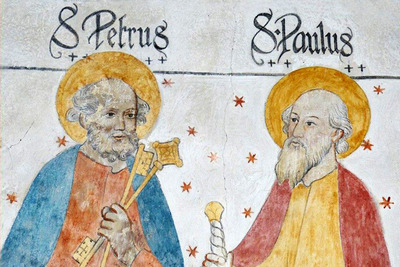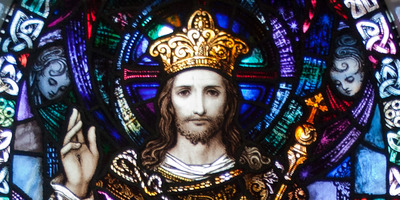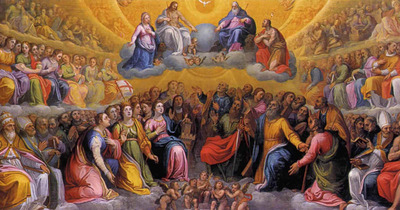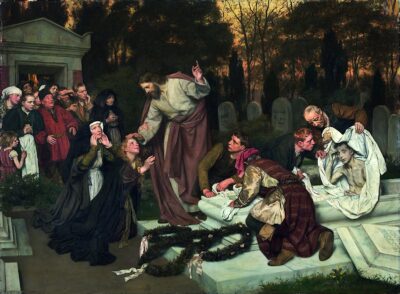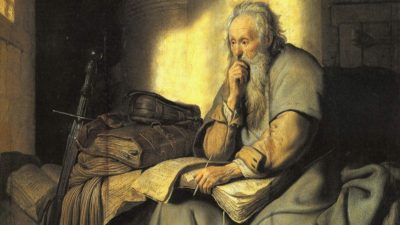November 1, 2024
|by N W
|
0 Comments
|
Mission, Saints, Vocations
Solemnity of All Saints
November 1, 2024 — Year B
Readings: Rv 7:2-4, 9-14 / Ps 24 / 1 Jn 3:1-3 / Mt 5:1-12a
by Rev. Nixon Negparanon, Pastor
Last night at the Vigil Mass for All Saints Day, there was a boy who was wearing a costume of a saint, maybe a pope or a priest. And I smiled when he fell in line for Communion, and I gave my appreciation to the boy after Communion before the final prayer, simply because one meaning of Halloween is the eve of the holy, and if it’s the eve of the holy, what costume should our children be wearing? It should be costumes for saints, not those scary things. In fact, I mentioned it last night; yes, it’s only for fun, but it’s not something proper for that day, if we truly observe the eve of the holy, because it’s like inviting those unkind or evil spirits. And once that evil spirit enters our homes, we call the priest.
This reminds me of when I was in my previous parish. There was a Baptist lady who came to our church and asked for a blessing for her house. I told her she needed to go to her pastor, and she said that her pastor did not know what to do and told her to go to a Catholic priest. As a priest, even though the person does not belong to your congregation, you help. When people need help, we just have to help. That’s our job as Christians, not only as Catholics, as Christians.
Brothers and sisters, we know that every November 1 we celebrate All Saints Day. What is the purpose of the Church in celebrating All Saints Day? The Church celebrates All Saints Day simply because this reminds us of our vocation to be holy. By virtue of our baptism, Christ called us to follow Him, to become holy, to become saints. A French Catholic novelist, Leon Bloy, said the only real sadness, the only real failure, the only great tragedy in life is not to become a saint. True, although in life, we have many failures. When we were children growing up, we had some failures – we disobeyed our parents, or in school we experienced failures. These are part of life, in jobs, and in everything. But at the end of our lives, the only thing that matters is our salvation. To become a saint is the only thing that matters at the end of the day.
If we fail to become a saint, to be the person whom Christ expects us to be, then we fail in life. That is why, brothers and sisters, if we understand this kind of thinking, our perspective in life will surely change. The many things that we value a lot in life, we will realize that they are just trivial and that they are not really important. The important thing in life is to become a saint, because one day all of us desire and dream to be in heaven, and we can only be there if we become a saint. That’s why Leon Bloy was right that the greatest failure we have in life, the only failure that we will regret for the rest of our lives is not to become a saint. That’s why when we realize this kind of thinking, we will have that wisdom in our lives. Wisdom is having a sense of what is really important in life and what is secondary or less important.
We will start to realize that many things in this world are just not really important. What is truly important are the things that help to bring us to our salvation and make us a saint. Wisdom is the ability to discern what is of lasting value and what is of passing concern. Yes, we may become popular, we may become a mayor, a governor, a president, priest, a nun, a deacon, or a bishop. We might become rich and powerful. But if we do not become righteous or a saint, everything is useless. We don’t want to regret at the end of our lives that we failed to do that.
What is it to be a saint? When we hear the word saint, we think of people who are perfect beings. We think of people who are not tempted, people who never get angry. These are the misconceptions that we have about saints. Saints are actually human beings like us. They also get angry, they fall in love, they have flaws and shortcoming in life. Sometimes they also commit sin. Pope Francis once said that saints are not superhumans; they are people who love God and who share this love with others. And that is a saint. We experience the love of God and we want to share that love of God with others.
In all ways, in all aspects of life, we just have to share that love with others, loving even those people who are difficult to love. Saints try to follow the two commandments – love of God and love of neighbor. Love your neighbor as yourself. That’s why this beautiful quote is helpful for us: Saints are sinners who never stop trying to do good. That’s a real saint. Saints are sinners who never stop trying to become better persons. That’s what Mother Teresa tells us.
God does not call us always to be successful. He always calls us to be faithful. Every time our weaknesses resurface, our shortcomings will come out. All we have to do is ask the Lord’s forgiveness and start all over again. That’s the kind of life the saints have.
Bishop Robert Barron once said: “To be a saint is simply to become a friend of God.” This means allowing God to live in us. If we become friends of God, then we allow him to penetrate our whole being. Saint Paul tells us, in his letter to the Galatians (Gal 2:20), “It is no longer I who live, but Jesus who lives in me.” That’s very important; if we become true friends of our Lord Jesus Christ, we allow Him to enter into our being. That’s why every time we go to Mass and receive Communion, it is a good reminder for us that before we receive Jesus, we believe that is Him – not a symbol of Jesus. But that is Him that we are receiving. He said, “This is my body.” So that is Him that we receive. That is why that every time we partake of Him, He becomes part of our being. And by consuming Him, we pray and we hope that we think and we speak and we act like Jesus.
That’s very important. Make that act of faith or prayer; do that prayer. “Lord, I’m going to receive You right now. I’m going to consume You. And You are going to become part of my system and of my body. You go to my stomach, and You will be distributed to all the parts of my body. And I want You to transform me to become like You, so that everything that I think, everything that I will say and do and think will be like You.
But brothers and sisters, perhaps we may also ask the question about whether becoming a saint means that we lose our individuality. Does becoming a saint mean that we also lose our personal life? The answer is no. In fact, it is surrendering of ourselves to Christ. We discover ourselves and our true happiness. Look at the saints; when they started to offer their lives to Christ, they became peaceful and happy. They found meaning in their lives. Why? That’s just the grace of God. We cannot explain that. The world cannot give that kind of grace, that peace, that meaning in life to us. Only the Lord can give that to us. That is why, when Christ reigns in our lives, what will disappear? In us, first our ego, our pride, our self-centeredness, our worldliness, and our greediness. They will all disappear. If Christ reigns in our lives, all of that will go away. We won’t use our pride anymore to defend ourselves. We remain humble in everything that we do. So, in Christ we can truly be free.
So, who are the so-called saints? One of the beautiful things in the Catholic Church is that are a variety of saints. We know that there are saints who are both male and female. There are saints who are both rich and poor. Some are educated, and some are innocent. Some are old, and some are young. There is a variety of saints, and there is no one single type of saint; rather there is a wide variety of personalities with different styles and backgrounds and education. But what do they have in common? They all became friends of God. They allowed Jesus to influence their lives. They allowed Jesus to reign in their lives. That’s why in everything that they do, they speak in reflection of the things that Jesus taught them. There’s no saint that expresses the fullness of God; rather, each of the saints in his or her own unique way expresses something of the goodness of God. True. Only Jesus reveals to us the fullness of God, but the saints reveal only something or part of the goodness of the Lord.
That’s why many saints have many different ways of expressing the goodness and the love of God. That’s why nowadays, Pope Francis canonized few saints. One of them is St. Titus Brandsma. He died of lethal injection in a concentration camp, and one of his famous sayings is, “Do not yield to hatred. We are here in a dark tunnel, but we have to go on. At the end, an eternal light is shining for us.” Amazing! Despite the threat to his life, despite the difficulty and challenges that he faced, he remained trusting and having faith in God.
That is very important for us, especially when our faith is being tested. I hear a lot of people questioning whether God really exists, with all the troubles of the world: “I’m worried about myself, I’m worried about my children. What will happen to the world? The church is being attacked. God must not have seen what’s going on in the world.” Of course, the answer is no. If we think about persecution of the Church, the Church has experienced a lot of persecutions. Remember those Dark Ages. Remember those times when the Church was being suppressed by emperors and kings. Those mighty powers with great powerful kingdoms – where are they all now? They’re all under the ground. But how about the Church that they were persecuting? The Church has no guns or armies; it only relies on God’s grace and power. It continues to grow even larger. And that’s the face of God. Perhaps, if we were in that time when the persecution happened, we would have said that God does not exist; he allowed my brother or my family member to be murdered, to be fed to the lions. Perhaps we would have that kind of thinking that God does not exist. Do you think those people in that time would believe in how the Church is growing today? If they saw how the Church is growing right now, those people would likely have said that is impossible, and we would never think that the Church would continue to live.
But the grace of God works differently. That’s why the scripture remains always true. God will always humble the proud. Those of you who pray the breviary every day know that plan. And even Jesus is always true to His word – I will be with you until the end of time. That is very true up to now. Worrying about what’s going on in the world, God sees everything. Trust and have faith in Him, and you will be free of anxiety and depression. Yes, it doesn’t mean that the problem will disappear; it will still be there, but it will not lead you to succumb to the depression and anxiety. Because we know that there is a God who sees everything, and He can do anything He wants in this world. He can transform anything in a split second. All you have to do is to trust His will in our lives.
Another saint that we need to remember is Blessed Carl Acutis, who is the first millennial to be beatified by the Church. In his short life of fifteen years, he showed to the world that he was a normal person. Like any other young man or woman who likes to use a computer, he knew how to use the internet and social media. But despite all this, Carlo Acutis loved God. And he said that he used his skills to spread the good news. In fact, he made a website that tells us of Eucharistic miracles that have happened in different parts of the world.
So, brothers and sisters, what should be our challenge today as we celebrate All Saints Day? I think it would be very good for us to choose a saint to imitate. Choose a saint that you can relate to, or one whose life you could follow. Mother Teresa of Calcutta, because she was a saint who loved to take care of the neglected and the poor. Or whatever saint you would want to imitate. And pray for that saint and ask that saint to help and intercede for you. I hope, brothers and sisters, despite your busy schedules, or the things that you enjoy in life, I pray and I hope that you will become friends of our Lord Jesus Christ. And let us not forget the only real sadness, the only real failure, the only great tragedy in life is not to become a saint.
KEEP READING
 540-586-8988
540-586-8988 

